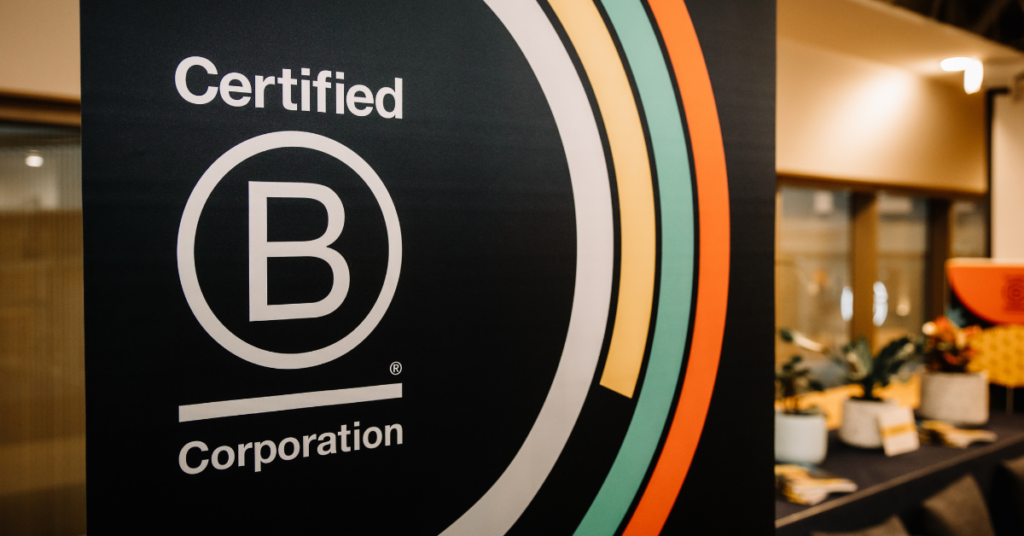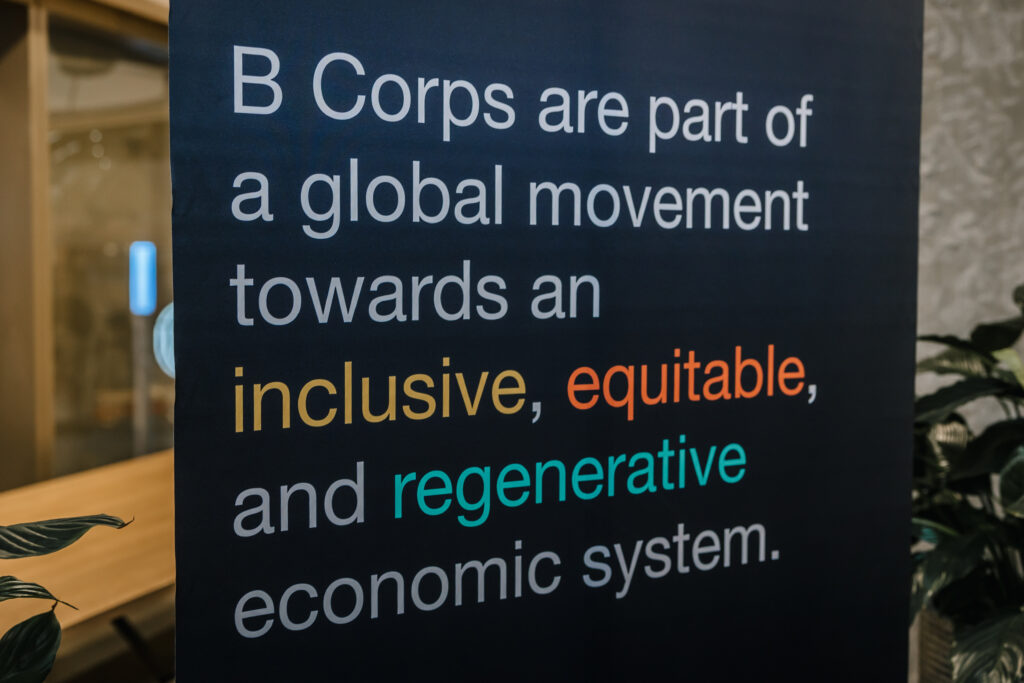It’s hard to scroll, scan or shop without seeing it. It seems that everywhere you look, from your local coffee shop with the line out the door to your global accounting firm with an arms-length waitlist, there is one thing that’s starting to define a successful business. One thing that a business will soon be unable to be truly triumphant without, one thing that is helping businesses outlast the rest, and that one thing is: purpose.
Companies that are committed to making a positive impact alongside making a profit are known as ‘purpose-driven businesses’; businesses that prioritise social and environmental responsibility, accountability and transparency in all aspects of their operations.
Driven by a clearly defined reason for being, these businesses have a clear sense of their mission and values, a clear sense of who they serve, and a clear sense of their ‘social contract’ for doing business, as Bob Lurie wrote back in 2009.

While it largely goes without saying, purpose is and always has been at the epicentre of the B Corp movement. However, with a record number of applications for certification and more businesses than ever using the B Impact Assessment to manage and measure their impact, it seems that purpose has now entered the mainstream.
Beyond the buzzword
While it might feel that the world is awash with ‘purpose’ right now, or that its ubiquitousness waters down its meaning — the way we see it — being purpose-driven is as much about who you are, what you deem important, and what you do about it, as it is about why you exist.
Going beyond the buzzword, what sets purpose-driven businesses apart from the rest is that their success is defined holistically and acted on earnestly. They work from a place of deep alignment, inspiration, and commitment to creating meaningful value for all stakeholders, including customers, workers, suppliers, shareholders, the broader community, and the environment.
With purpose deeply intertwined with the health and wellbeing of the world at large, purpose-driven businesses absorb external shocks and turn them into opportunities for sustainable, inclusive growth. In other words, they don’t just bounce back from misfortune or change; they bounce forward.

What sets purpose-driven folks apart from the rest
For Carolyn Butler-Madden, author of For Love & Money and Founder of B Corp The Cause Effect, there is a marked difference between an organisation that has a purpose compared to one that truly lives out its purpose. The difference? Purposeful organisations are driven by action. Without action, purpose is little more than an empty promise.
Research shows that organisations who are truly purpose-driven are more agile, resilient, innovative, and financially outperform those organisations who either do not have a purpose statement, or those who have one, but do not act on it.
As early insights from the inaugural ‘Purpose In Progress’ survey show — a partnership with DrawHistory seeking to understand how significant events such as the pandemic impact people’s sense of purpose in life and at work in our region — business actions speak louder than business words.
More than a vision, more than a statement, more than office perks — truly purpose-driven businesses go beyond all of that. They take action for a better world, and are brave enough to be transparent and held accountable for it.
“The reality is, there is no shelf life on change and no expiration date on organisational resilience. There will always be more uncertainty, more change. The companies that cultivate organisational resilience — driven not only by crisis but also by opportunity — can gain an important, lasting advantage.”
— Dana Maor, Michael Park, and Brooke Weddle for McKinsey & Co, 2022
How purpose cultivates resilience in business
As Maor, Park and Weddle attest: “resilient businesses set a strategic direction that is grounded in purpose and outcomes rather than in just checking boxes”. That means, when the organisation needs to shift to a new business model or otherwise make trade-offs in times of crisis or upheaval, the change can happen more quickly and with less collateral damage.

Over a decade-long period, purposeful, value-driven companies have been shown to outperform their counterparts in stock price by a factor of 12. Some of the reasons purpose-driven businesses are more resilient is that they:
- Attract higher levels of customer loyalty — as consumers increasingly look for brands and businesses that align with their values, loyal consumers are sticking by their side even during economic downturns or other disruptions.
- Attract and retain talented humans and adaptable leaders — purpose-driven companies are often more attractive to job seekers who are looking for meaning and purpose in their work, and are more likely to be motivated and engaged over the long-term.
- Cultivate strong brand reputation and recognition — purpose-driven businesses are often seen as leaders in their industries and communities for prioritising social and environmental impact. Or as Rachel Barton puts it: ‘to affinity and beyond’.
- Enjoy more robust stakeholder relationships — by seeing their business as part of an ecosystem of stakeholders, purpose-driven businesses tend to build meaningful, long-term relationships and amass a strong support network that can help them weather challenges.
- Tell better stories — tapping into how our human brains digest and retain information, and engage with the world around us, purpose-driven businesses are never short of a wholesome and heart-warming story, reflecting back a more expansive vision for the world, as it is and as it could be.
- Unlock greater innovation and adaptability — by focusing on solving social and environmental problems, these businesses are more likely to develop new products, services, and business models that can help them navigate change and uncertainty.
And because of this commitment they are prepared to leave money on the table, if earning it conflicts with their purpose.
“Putting purpose at the heart of your business and its operations unleashes your people’s potential to show up fully and take action. It transforms empty words on a sheet or screen into noble, benevolent aspirations lived out in generous, kind, compassionate, and loving actions.”
— Carolyn Butler-Madden, The Cause Effect
As Butler-Madden continues: by seeing profit as an outcome, not a driver, purpose-driven businesses are able to financially outperform companies without a higher purpose and those with a passive purpose statement, shepherding truly purposeful organisations into an unstoppable force.

Purpose ≧ profit
It is a tired and oft-cited misnomer that purpose comes at the expense of profit, or that purpose-driven businesses don’t care about profits. They do. But while they may not always prioritise short-term profits over all-of-the-time purpose, they fundamentally recognise that creating sustainable value for all stakeholders is a critical part of long-term success and scalability.
Dying are the days of cut-throat commercial logic where business is seen through a zero-sum lens; one where purpose comes at the expense of profit, and in order to ‘do good’ your bottom line has to look not so good.
Purpose and profit can be, and are being, mutually reinforced and amplified by businesses across this movement every day who are going beyond business as usual to create win-win-win scenarios for people, planet and communities.
As part of our work to create and normalise an economy, and a world, where every business is driven by a higher purpose, we asked a handful of B Corps to reflect on what it means to be purpose-driven and how they are generating tangible and measurable social and environmental impact with purpose at the heart. This is what they shared.

Putting purpose to the ultimate test with Intrepid Travel and Hub Australia
Two of the industries hardest hit by the COVID-19 pandemic were travel and co-working or hospitality spaces. And when times are tough, it’s often the ‘nice-to-haves’ that get thrown out the door. For Intrepid Travel, that was never going to mean purpose:
“The pandemic was the ultimate test of our ‘purpose and profit’ business model. It made it increasingly challenging to get the balance right. And in some cases, we didn’t. But despite the future of the company itself being in serious doubt, we chose to double down on the commitment we made as a B Corp to use business for good.”
— James Thornton, Intrepid Travel CEO
As a pioneer in sustainable travel, Intrepid’s leaders consider it their responsibility to enjoy the natural environment while safeguarding it for future generations. While this is not a company that shies away from its desire to be profitable, it has never been motivated by “money for money’s sake”.
“We never lost sight of our purpose – in fact, we used it as a North star to guide us through some of the toughest days. Now on the other side, growing again and having recorded the highest sales month in history, we can confidently say we’ve emerged from the pandemic with an even stronger sense of purpose.”
— James Thornton, Intrepid Travel CEO
By recognising that profitability is essential for them to realise their ambitions, all key decisions are guided by balancing the ‘package deal’ of purpose and profit.

Photography by Shaun Busuttil
Creating positive change through the joy of travel with Intrepid ↗
For over a decade, Hub Australia has been providing premium workspace solutions to help businesses and their teams love where they work (again). After experiencing major workplace disruptions since 2020, they know as well as anyone the trials and tribulations that come with running a business, any business. And what got them through, alongside a commitment to purpose, was their community.
“Community has always been a significant part of what we do rather than a ‘nice to have’. As a B Corp, our commitment to community means that we provide a workspace experience to our members that they genuinely love coming into and that helps them be part of something bigger.”
— Brad Krauskopf, Founder and CEO of Hub Australia
For Hub, going beyond profit has been one of their core values from day one. While there’s no denying that the world of work looks very different now to what it did a few years ago, Krauskopf believes that their commitment to purpose and people helped guide them through the pandemic storm.
“There’s no denying that the pandemic completely changed the way we work. And our community of like-minded people significantly contributed to us weathering the storm of the pandemic, and continuing to thrive in this next phase.
“If I was to connect it to a ‘why’: people know that they don’t have to physically go somewhere to work, but we all want to belong to something bigger. This is only more pertinent since the beginning of the pandemic.”
— Brad Krauskopf, Founder and CEO of Hub Australia
This holds particular weight coming from a company who recently celebrated 10 years of being a B Corp, as one of the first Bs in our region. ESG Manager of Hub Australia, Whitney Teluk shares:
“My biggest learning over the past 10 years as a B Corp is, honestly, probably how commercially beneficial the certification has been. I wasn’t expecting there to be such an awesome return on investment in becoming a B Corp.”
— Whitney Teluk, ESG Manager Hub Australia

Image: Whitney Teluk, ESG Manager Hub Australia
How Hub Australia is making it work better for people, planet and communities ↗
Why talk is cheap and the time to walk is now
It’s hard to think of an industry more notorious for espousing a ‘profit over all else’ mindset than banking and finance. For purpose-led finance brokerage and B Corp, Pure Finance, they think you’d certainly “be forgiven for doubting the sincerity of a financial services business claiming the moral high ground”. When it comes to doing things differently, in their words: “talk is cheap, and the time to walk is now.”
For a decade, Pure Finance has been calling for a more ethical and equal financial system where no one is left behind. Putting their profits and their purpose where their mouths are, one of the reasons they are so passionate about business as a force for good is that they know in black and white that doing good is good business.
“The opportunity for positive impact tied to money lending cannot be overstated. And we’re passionately committed to debunking the misconception that ethical finance options are more expensive or inferior.
“The demand for more socially and environmentally conscious products, offered by ethically driven organisations, such as Bank Australia, has continued to grow year on year. Many of our clients specifically choose to work with financial institutions like this, not only because of their purpose-driven business models but because, contrary to popular belief, their ethical options often hold up against (and sometimes even surpass) the rest.”
— Pure Finance
Bit by bit, companies like Pure Finance and “their fellow finance-y B Corps” are working hard to keep financial institutions accountable, empower consumers to make informed and value-aligned choices, and create a world where ethical financial institutions are the rule, not the exception.
“While not everyone may be able to access an explicitly ethical loan straight off the bat, having a purpose-led business model allows the people we work with to maintain a positive impact, regardless of their product choice.”

Creating a more ethical and equal financial system with free education platform ‘Ladies Talk Money’ ↗
The future of finance is ethical
A world where ethics no longer means inferior returns is not just finance of the future, it’s here now. As the first customer-owned bank in Australia, the aptly named Bank Australia has continued to see strong growth since becoming a B Corp in 2020, and formalising its commitment as a purpose-driven business.
“Ultimately we know that being a purpose-driven, values-based business is a key reason why customers join us. How do we know that? We ask them! We regularly survey our customers about the issues that matter to them, and they have consistently told us that climate change is their number one concern, and they expect us to take action on their behalf.”
— Cheyne McKee, Head of Corporate Affairs, Bank Australia
Since launching the ‘Bank Australia’ brand in 2015 (formerly CSIRO Co-operative Credit Society along with 71 other smaller lenders), they have seen their ‘clean money promise’ strongly resonate with new customers.
“The way banks use your money shapes the world we live in. So, we choose to do business with people, businesses and organisations who believe in a fair and just society. By committing to using money to benefit people and the planet, in addition to being a good bank with competitive products, our business has been growing strongly.”
Slowly but surely, we are all realising the true power we have to shape the world we live in, be it in the products we buy, the services we use or the banks we choose. For ostensibly purpose-driven businesses like Bank Australia, the proof is in the (asset) pudding.

Not only do they firmly believe that it’s possible to provide great banking services and products, at the same time as being a business that genuinely makes a positive impact — they can show that it is.
“In the last financial year, we had over 21,000 new customers join our bank, and our loan and deposit books grew by 16.9% and 12.2%, which is well above the banking sector’s system growth of 7.0% and 9.0%, respectively. Over half of our customer base is from our target market of socially-aware people, and we know the average age of our new customers is now 35. We know they care about their impact on people and the planet.”
Taking a holistic view of business and impact
With a name that reflects both its heritage, ongoing purpose, and a ‘path’ to creating their own way forward, First Sentier Investors is passionate about investing responsibly over the long term.
As global asset managers, they believe that investors really can have it all these days — investing with purpose and seeing strong returns.
“We think about investment holistically and for the long-term. Our approach to responsible investment is underpinned by a focus on stewardship, continuous engagement and responsible allocation of our clients’ capital. Our investment teams consider environmental, social and governance (ESG) outcomes within the context of their portfolios.”
— Kate Turner, Global Head of Responsible Investment, First Sentier Investors
As future-focused investors, First Sentier Investors take the role of sustainability seriously. And “just like items immersed in honey,” they know all too well that the investment decisions made today will impact people, the planet and communities in the future.
“Our clients, employees, and the communities we operate within, expect us to consider [investments] from a sustainability point of view, based on the complex issues facing the world today. Our approach to responsible investment is important as we navigate through uncertainty, while addressing complex global challenges such as climate change, human rights and modern slavery, nature and biodiversity, and diversity and inclusion.”
In an ‘investment universe’ where every decision about where to allocate capital is akin to “a vote on the company’s fitness to be in business,” they believe that the more we can come together as businesses, with a shared purpose and to share ideas, the greater chance we have to create a better tomorrow. And we couldn’t agree more.

So what happens now?
We know that operating a business with more than profit in mind is a fundamental part of being a B Corp. We also know that B Corps are for-profit businesses that exist to make money; the difference being that they don’t only exist to make money. Instead, they measure success and impact on a quadruple bottom line of people, planet, profit, and purpose.
Living and breathing a newer, and more purposeful ‘business as usual’ is about walking the talk today, and tomorrow, the day after that, and the year after that. Curious about joining the B Corp movement and unleashing greater impact, purpose and prosperity for all? Here are three ways:
- Access our Guide to becoming a B Corp to help you navigate your certification journey from start to finish.
- Join an upcoming Become a B Corp workshop held by a qualified B Consultant.
- Try our free B Impact Assessment tool, helping thousands of businesses manage and measure their impact.
Thank you to Intrepid Travel, Hub Australia, Pure Finance, Bank Australia, and First Sentier Investors for sharing how they go beyond business as usual and embed purpose to make their mark on the world.
Find out more about the businesses going beyond and get involved in this month’s B Corp celebrations by visiting: bcorpmonth.com

